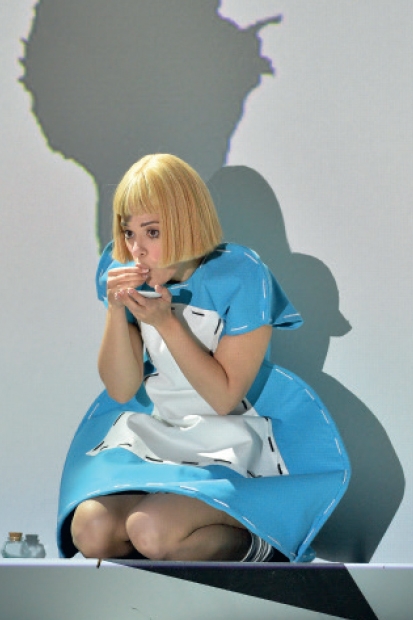It’s December, and while musical theatre is busy celebrating ‘warm woollen mittens’, opera, as usual, is far more interested in the tiny frozen hands inside them. Because nothing says Christmas quite like consumption, and I’m not talking turkey and mince pies.
London’s opera companies are serving up a heaped sleighful of heartbreak this year. English National Opera is going traditional with La bohème, while the Royal Opera is thinking outside the snow-covered coffin with Carmen. There’s something for everybody, so long as it’s tragedy.
ENO’s Bohème is the safe option, the show you take your granny to. She’ll be enchanted by Jonathan Miller’s production, which makes its young bohemians’ poverty just picturesque enough (their Parisian garret is stark rather than squalid), and might not even notice the rather workaday performances in this fourth revival.
First seen in 2009, Miller’s Bohème nudges the action forward some 100 years to the ‘années folles’ of the 1920s. Café Momus becomes an edgy guinguette where Fitzgerald and André Breton might have traded writing tips with Rodolfo, and a Josephine Baker-esque Musetta (Nadine Benjamin) holds the stage. It’s a neat sleight-of-hand, nicely framed in Isabella Bywater’s revolving sets — an unobtrusive restoring of operatic order after Benedict Andrews’s teenage rebellion of a crack-den Bohème for ENO in 2015.
But if snow dutifully falls and the children’s chorus pipes shrilly and evocatively, it still lacks that closing stab of emotion that should send you out of a Bohème broken as only good opera and bad Victorian novels can. Alexander Joel gets some beautiful sounds from the orchestra, but tends to indulge, overworking a score that shines under the lightest of touches. Jonathan Tetelman’s Rodolfo lacks any sense of Italianate release, but his handsome, dark-toned tenor is a good match for Natalya Romaniw’s dusky Mimi.
On paper, the Welsh soprano — an outstanding Tatyana and Jenufa — is the big draw of this revival, but sounded out of sorts on press night. Intonation issues marred what may yet grow into a thoughtful performance, leaving it to Nicholas Lester’s personable Marcello and a tenderly sung Colline from David Soar to top up the pathos.
Barrie Kosky’s Carmen took a beating from critics when it premièred at the Royal Opera back in February (having previously been seen in Frankfurt). But it’s hard to see why. The Australian director takes a hackneyed piece, riddled with problems and buried under a thick crust of dramatic convention, and cuts it loose. If the result can be a little wild, a restless parade of ideas, images and action, it’s also utterly exhilarating — a production that is at once an all-singing, all-dancing Broadway spectacular and a sly, revisionist subversion. Kosky finds a novel way to kill his heroine and keep her too, squaring the circle of 19th-century opera with insouciant ease.
Prosper Mérimée, author of the novella on which Bizet based his opera, described Carmen as a woman ‘…who consecrated herself exclusively to the public’. This is the heroine we get from Kosky — not the exotic, passionate pin-up girl of popular imagination, but a consummate performer, for whom love, and even death, are simply a show to be staged.
And what a show Kosky gives her to star in. His Carmen is both author and heroine, ringmaster and circus animal, challenging and wrong-footing us at every turn — a slash of defiant colour in a monochrome world. A giant staircase dominates the stage. It’s a vantage point for men to watch women, but more importantly it’s a Busby Berkeley-style set for Carmen to tell her story on. Because, make no mistake, it’s Carmen doing the telling here. From the prerecorded spoken narration (replacing all dialogue) and Carmen’s own imperious gestures that can summon a chorus or usher in the next Act, to her wittily desexualised ‘Habanera’ and the twist of the opera’s final moments, she is a woman absolutely in control.
It helps that in Gaelle Arquez (a late replacement for the indisposed Ksenia Dudnikova) Kosky has a consummate singing-actress. There’s not a pout or smoulder in sight as the mezzo finds quieter ways to own the stage. This is a Carmen who’d kill you as soon as kiss you, choosing whichever promised her the loudest round of applause. Brian Jagde’s Don José is pure operatic beefcake — all vocal power and nothing behind the eyes. He’s the perfect disposable lover and foil to Alexander Vinogradov’s preening Escamillo, whose singing is almost as exciting as his salmon-pink socks.
Running markedly (and mercifully) shorter than last time, this revival has trimmed not only narration but also some musical episodes. It’s a smart choice, upping the pace and intensifying the focus. Conductor Keri-Lyn Wilson drives the orchestra hard, generating some disagreements between stage and pit that will doubtless resolve as the run continues.
Teething issues aside, Kosky’s Carmen is still the smartest show in town, and the most fun. Your granny might not like it much, but that’s what the André Rieu Christmas special is for.






Comments